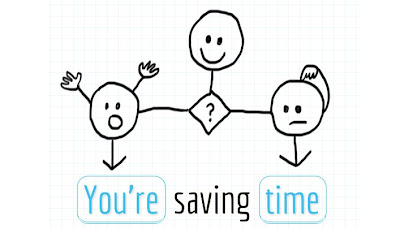I was thinking recently about the poem by Robert Frost, The Road Less Taken. For those
unfamiliar with the poem, it begins with
“Two roads diverged in a yellow wood”……
It makes me wonder if a poet today had written such a
piece would they have begun with the
following:
“Forty-Two roads diverged in a wood...
-and then I just
couldn’t make a choice”.
Today, no matter where we go and what we do, we are
presented with choices, options and extras.
Sometimes it’s comforting to know we have options. Other
times, the simplicity of a single path is a welcome relief from the
overabundance of options available in so many aspects of our life.
One project of the past year illustrates this point particularly
well.
CASE STUDY: Catholic Faith Handbook for Youth Catechist
Guide
The project team for the Catholic Faith Handbook for Youth Catechist
Guide wanted to ask our customers to evaluate the ease of use of a lesson plan
format. The team sent two different lesson samples to five different customers
and asked the customers to carry out specific tasks with each version. (The tasks came from the teams understanding
of the customer’s weekly lesson ritual which had emerged during their site
observations.)
Then the team waited to receive the customer’s feedback. The
team was seeking feedback not aimed at a customer’s impression of a product or
whether they would prefer to use this product over another. Rather, the team wanted to get to the root of
the product and understand the customer’s experience of carrying out the
specific lesson related tasks by using –and forging a path through-each of the two
sample lesson plans.
How easy would it be for the customer to use the lesson plan
to carry out the work they needed to complete?
What happened was something I don’t think the team anticipated.
I know I didn’t.
This is a summary of what happened.
Brian S-T stopped by my (Heather’s) office and said, “We got our
first reviewer back, do you want to see the feedback?”
We looked at the feedback and said to each other, “Well let's see,
maybe it won't all be this clear.”
By the end, we were surprised, because this is what we saw.
With regards
to using Lesson Plan “B”, customers said:
- “Early on I realized that these lessons were a little too complicated for some of my teachers, so I streamline the lesson plans by writing the specific areas and activities they should cover in each lesson. Basically, I rewrite the lesson plans.”
- “I feel this Lesson Plan was too cumbersome for a greenhorn volunteer teacher."
- “This lesson would be difficult for those not used to looking through curriculums, and they might need to do a lot of preparation”.
- “This plan is not very easy to use, especially if you have limited teaching experience.”
- “It is way too much for what we need to teach our classes. Our catechists get overwhelmed with all this information.”
With regards
to using Lesson Plan “A”, customers said:
- “Lesson Plan A is so much better for volunteer teachers who do not have formal teaching experience.”
- “Lesson Plan A gave me much better direction.”
- “These would be much easier for my catechists to use.”
- “I like the simplicity of it.”
- “I thought this was MUCH better than the other catechist handbooks that are out there as far as ease of use.”
- “For us small parish volunteer teachers who are not theologians nor college educated teachers, and most of us have never attended a Catholic school, I found this format non-intimidating yet informative and chronologically arranged. Easy to follow and good guidance.”
- “I think this would be great for a volunteer catechist, it tells what the important things they need to learn are, gives activity ideas, and helps guide them into scripture and discussion.”
- “It is very well laid out – not too much, just the right amount of information.”
- “Thank you for creating lessons that volunteers can use!”
For the
record, Lesson Plan “B” was the product in its current state of content and
design, available for purchase on our website.
Lesson Plan
“A” was a version containing a variation of content quantity, activity ideas,
design, layout and organization based on what we understood our customer may be
needing.
After
received the feedback, the project team reconvened and came to the conclusion
that in terms of usability for our customers, it was pretty black and white.
In Lesson Plan
“B” (the product in it’s current state of content and design) we had covered
all the bases covered for the customer. This version assumed that the user
would prefer the highly designed lesson plan and that the customer would need and
want every option and every aspect of direction.
In Lesson
Plan “B”, we wanted to provide the user with every possibility and in doing so,
we gave them more than they could carry.
As a
publisher, we want to help lighten the load of those we serve.
In Lesson
Plan “A”, the project team came up with and then tested an innovative solution that
involved--not adding to the lesson plan-- but rather scaling it back and
highlighting a more clear-cut and direct path through the material.
As our
customers persevere in their work of spreading the gospel, let’s assist them
(as this project team did), by
continuing to clear the path of infinite options and light the way to a single
path so that their experience is one of clarity and one which saves them time.
As we do, we
will continue to affirm for them that what they can expect from their partnership
with us and their use of our products is an experience of –signature
simplicity.

